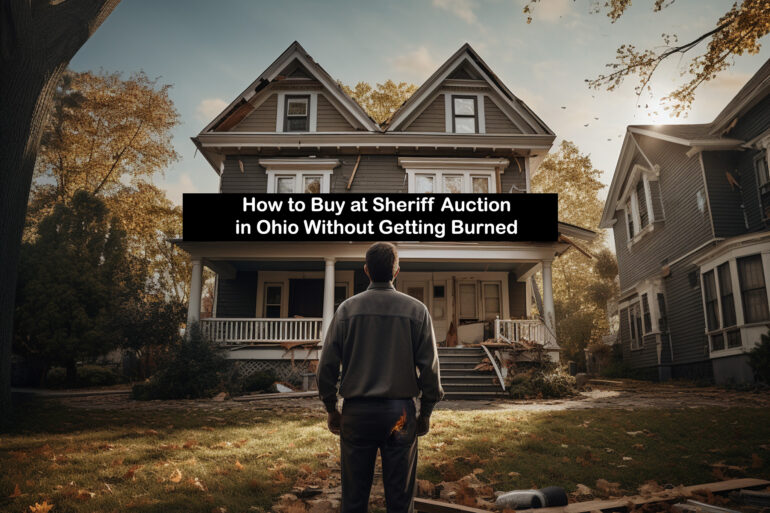How to Buy a Sheriff Auction Property in Ohio Without Getting Burned
Buying foreclosed properties that are auctioned by Ohio’s Sheriff’s Departments represents a potentially lucrative opportunity for real estate investors. Many newcomers to real estate investing are unfamiliar with this process because these auctions were largely nonexistent during the COVID-19 pandemic.
During the unprecedented COVID years, moratoriums halted most foreclosure (and eviction) cases. Many U.S. homeowners were also offered temporary mortgage forbearance options that prevented many new or pre-foreclosure actions.
While plenty of investors have had very rewarding outcomes with buying from sheriff auctions, others have found themselves in a mess. Why? Properties in sheriff auctions are sold “as-is” or “sight unseen” without prior inspection. Also, a buyer might unknowingly face large unpaid utility bills, IRS liens, remaining occupants, and a host of other possible pitfalls.
Ohio now appears committed to electronically conducting all of these county auctions.
How Many Auctioned Property Opportunities Are There in Ohio?
Nationally, there were more than 320,000 foreclosures in 2022, which is a 115% increase over 2021; yet, was 34% below the pre-pandemic levels. In Ohio, roughly 13,400 new foreclosures were initiated across the state’s 88 counties during 2022. Viewed another way, approximately one in every 3,000 properties in Ohio were currently in some phase of the foreclosure process.
Moving forward, even in slow years, Ohio real estate investors will find an ample volume of potential properties in foreclosure during any given month of the year. Several different types of properties are auctioned, including single-family homes, multi-family homes, and condos.
Auction Location and Platform in Ohio
In 2016, Ohio introduced ORC 2329.153, which established an official public sale website for these purposes using an auction management system. The general public may access each county’s site to view properties, important dates, and any related photos or documents.
Ohio now appears committed to electronically conducting all of these county auctions. For example, Cuyahoga County’s website provided details regarding the “proxy” bidding process. Here, a bidder enters their maximum bid amount before the auction. During the auction, the system will continue bidding on your behalf in $100 increments (as needed) up to your predetermined maximum.
Private Auction Alternative
Also in 2016, Ohio implemented a statute allowing a Private Selling Officer (PSO) to facilitate public auctions —I nstead of the county sheriff.
A PSO is a person or entity that possesses both a real estate license and an auctioneer’s license in Ohio. Increasingly, properties in counties across Ohio are auctioned through PSOs.
Many newer real estate investors purchasing these properties for purposes of “fixing and flipping” might need to seek nontraditional or unconventional sources of short-term financing.
Can You Finance These Purchases?
Most of those competing for auction properties are cash buyers. Although sometimes challenging, it is possible to finance a property purchased through a sheriff’s auction. Many traditional lenders simply will not approve loans for properties unless a detailed inspection is completed.
Seasoned real estate investors usually build relationships. Within this network, they likely develop contacts with industry professionals that provide financing.
Many newer real estate investors purchasing these properties for purposes of “fixing and flipping” might need to seek nontraditional or unconventional sources of short-term financing. Some of the possible options might include friends or family, a home equity loan or line of credit, or borrowing from a retirement account.
Rocket Mortgage reports that foreclosed property purchases financed using FHA loans are sometimes possible. However, FHA loan approval requires that the property meet some basic “livability” standards and a more exhaustive appraisal process, which will often impede these efforts.
Because of the inherent uncertainties associated with buying foreclosed properties through an auction, investors must be extremely diligent and cautious.
Potential Pitfalls
NOTE: The state’s statute explains that all properties are sold “as is, where is.” The counties assume no responsibility for variables associated with condition, title, liens, encumbrances,or zoning…
As indicated, there are a few potentially expensive surprises (risks) that buyers must be aware of.
Substantial property damage: Many of the foreclosed properties have been neglected for long periods and need extensive repairs. In some instances, an angry home occupant will deliberately create significant damage. Buyers should conduct a curbside inspection of the property whenever possible — without violating local trespassing laws.
Water damage is also a big concern, as the development of mold is likely and some termite species prefer water-damaged wood. Vandalism is possible ,such as graffiti or broken windows. Theft is another problem as people remove copper piping, aluminum siding, or other materials of value.
Title-related problems: Completing a thorough title check is very important. Title issues may exist during the process of foreclosure and result in incurring attorney fees. Be proactive here.
Utility Bills: The primary utility bill of concern for a buyer is the water bill. Perhaps, a pipe burst after a heating utility shutoff?
Federal tax liens: According to the Lorain County Sheriff’s Department, federal tax liens might still exist. Buyers are encouraged to begin with the office of the county recorder to identify potential liens.
HOAs: Homeowners associations, often associated with condos, are another possible unforeseen and costly concern. For example, the property may have unpaid fees and assessments, which might also now have collection-related costs. In Ohio, HOAs or COAs may have a lien on the property.
Remaining occupants (defendants): The Erie County Sheriff’s Department explains that after a buyer receives the Confirmation of Sale and Sheriff’s Deed, they assume control of the premises and should contact anyone occupying the property requesting that they vacate. If they fail to comply within a reasonable time, either the buyer or an attorney acting on their behalf should complete a Praecipe for Writ of Possession with the Clerk of Courts.
Next, the sheriff’s office will personally serve the order and/or post the order on the property. If the occupants do not comply, the sheriff will intervene and establish a lock-out date. The buyer must move all property to a storage unit at their expense. The belonging must remain in storage for a period of 30 days, at which time the property may be discarded.
Best Practices for Prospective Buyers
Purchasing during the pre-foreclosure phase offers advantages.
Understanding local (county) rules is vital, as they might vary. For example, Allen County requires that all deposits are sent via an automated clearing house (ACH) or bank wire transfer. ACH deposits must be received by a 5 p.m. deadline two business days before the auction and wire deposits must be received by a 4 p.m. deadline five business days before the auction date.
Properly Calculating All Expenses
Because of the inherent uncertainties associated with buying foreclosed properties through an auction, investors must be extremely diligent and cautious. A comprehensive preparation and evaluation process should include looking at the value of comparable properties (“comps”) and accurately calculating taxes, insurance, repairs, and more.
Having Help from Industry Professionals
Entering these opportunities alone, especially for newer investors, may increase the likelihood of facing costly problems. Consult with other industry specialists, such as local real estate agents, who will likely have a good understanding of the neighborhood, demographics, schools, and any upcoming infrastructure improvements or development projects.
Consider Properties in the Pre-Foreclosure Phase
When a homeowner falls behind on their mortgage payments or tax obligation, there is a “pre-foreclosure” period before the formal court proceedings. In Ohio, homeowners are typically afforded at least 28 days to respond to a foreclosure notice.
Purchasing during the pre-foreclosure phase offers advantages. For example, the current homeowners might be highly motivated to sell the property, and buyers will likely have the opportunity to perform a diligent inspection and appraisal.
In some cases, a short sale is possible — particularly in cases where the borrower owes more on their mortgage than the property is actually worth in the current market. Here, an investor might get a great deal, as the bank or mortgage lender may negotiate directly with you, your agent, or your attorney.
Real estate investors can certainly find properties that are of great value in Ohio’s county sheriff auctions. While these purchase opportunities may be lucrative, the risks are higher; therefore, doing your homework is critical. To avoid getting burned, buyers must ensure that their bid has a “cushion” that will minimize the impact of the inevitable unforeseen, underestimated, or overlooked problems.








